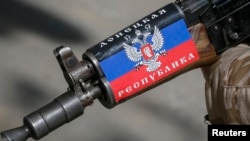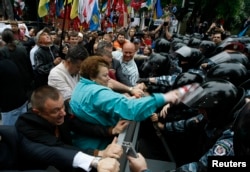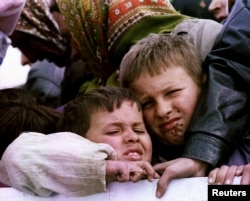WASHINGTON —
When Russian President Vladimir Putin reclaimed Crimea for Moscow, he called the territory “inseparable” from the motherland.
Putin justified the annexation by asserting the right to protect “millions [of Russians who] went to bed in one country and woke up abroad, overnight becoming minorities in the former Soviet republics.”
If the refrain sounds familiar, think back 20 years ago to the Yugoslav breakup.
Moscow’s moves have raised fears that Ukraine could plunge into the cycle of bloodshed and vengeance that killed more than 200,000 people and drove 3.5 million from their homes in the Balkan wars of the 1990s.
“Putin and the people in Russia who are talking about reuniting Russians, how they are artificially divided, and how this is a legitimate aim, are raising the questions that [late Serbian and Yugoslav President Slobodan] Milosevic raised when he was talking about Bosnia and some other places. I think that’s very dangerous,” said James Collins, a former U.S. ambassador to Russia.
Both conflicts date back to the 1991 collapse of two multi-national, federal, communist states, the Soviet Union and Yugoslavia.
Large numbers of Russians and Serbs – the dominant nationalities in those federations – found themselves spread among newly independent countries, notably Ukraine, Bosnia and Croatia.
Now, analysts say, an eerily similar script is unfolding to that which fueled Yugoslavia’s bloody breakup.
Nationalism and perception
After Ukraine’s president, Viktor Yanukovych, was chased from power in February, nationalists in parliament attempted to repeal a controversial law that allowed the official use of Russian and other “regional languages” in areas where they are predominantly spoken.
The law’s passage in 2012 had triggered violent street rallies and even a brawl among legislators.
In a conciliatory gesture, interim President Oleksandr Turchynov vetoed the repeal bill. Along with Prime Minister Arseniy Yatsenyuk, he has since pledged to strengthen the rights of Russian-speakers.
“The Ukrainian government is ready to conduct full-fledged constitutional reform which will strengthen the powers of the regions,” Yatsenyuk said last month in a televised address.
Similar tensions had simmered in Croatia following the victory of conservative nationalists in the 1990 elections, after which the right-wing government only slowly granted concessions to minorities.
By 1991, Croatian Serb uprisings – organized and armed by Belgrade – had turned into full-blown civil war.
As in Croatia, Yatsenyuk’s attempts to distance his administration from the nationalist fringe appear to have fallen flat among anti-government rebels in eastern Ukraine. They mistrust Kyiv and the pro-Western revolution known as Maidan that began there.
“Whatever really happened in Maidan, people in the east believed it was a return to what they’d seen in 2005-09 [when former pro-Western President Viktor] Yushchenko moved to ‘Ukrainianize’ the east and south,” said Vladislav Zubok, a Russian Cold War expert teaching at the London School of Economics.
During that period, monuments to World War II partisan Stepan Bandera were erected and those of Soviet soldiers taken down. Bandera is seen in western Ukraine as a nationalist hero but reviled in the east and by Russia, Poland and Jewish groups as a Nazi puppet.
“The issue resurfaced [in 2013-14] and was magnified by [Russian] propaganda, so people in the east reacted to the Maidan heroes as fascists. It’s a highly divisive issue that goes beyond even economic interests. Rhetoric is hugely important,” Zubok said.
Greater Serbia and ‘Novorossiya’
In Yugoslavia, Milosevic’s moves to defend Serbs purportedly under threat would land him in The Hague. He faced charges of masterminding a plan to purge non-Serbs from key areas of Croatia, Bosnia and Kosovo, committing war crimes, crimes against humanity and genocide.
“What [Milosevic] was interested in was a 'Greater Serbia' that would be created on the ruins of Yugoslavia," former Croatian President Stjepan Mesic told the Yugoslav war crimes tribunal in 2002.
Although Serbs eventually overthrew him, Milosevic skillfully played the nationalist card to attain soaring short-run popularity, a tactic, analysts say, Putin has utilized in full.
The Russian leader in March denounced Ukraine’s pro-Western uprising as a foreign-supported coup carried out by “neo-Nazis, Russophobes and anti-Semites,” saying it justified Moscow’s efforts to protect the population of Crimea.
It’s an area he described as representing “Russian military glory and valor.”
“In terms of symbolic value for Russian national pride, Crimea – Sevastopol in particular – beats everything else hands down,” Zubok said.
A Pew Research Center survey released earlier this month found Putin’s approval ratings have shot up to 83 percent.
Shortly after the annexation, Putin began referring to the arc of mostly Russian-speakers stretching from Moldova’s Transnistria to southeastern Ukraine as ‘Novorossiya,’ or New Russia, picking up on an expression used after the territory was captured from the Ottomans in czarist times.
Anti-government protesters rioting last month in eastern Ukraine chanted the term and activists in Odessa proclaimed the Republic of Novorossiya as an independent state.
“Russia’s endgame in Ukraine is very unclear,” said former U.S. diplomat Daniel Serwer, now a scholar at the Johns Hopkins School of Advanced International Studies. “If it’s merely broader decentralization of the Ukrainian government, that’s not unreasonable.”
“But if they’re trying to form a kind of Novorossiya, comparable to Republika Srpska in Bosnia, I think that’s something people would resist very strongly,” he said.
“There’s no question [Putin] is funding and encouraging paramilitaries to make trouble and using that as an excuse for intervention. It’s an ugly situation when you see an [elected] Russian leader pursuing the same techniques Milosevic used to dismantle neighboring states,” Serwer added.
But while pro-Russian separatists control some urban centers in eastern Ukraine, their grip on the area may be tenuous. Repeated public opinion surveys have shown that only about one-quarter of the population there wants to join Russia.
The Soviet east
Another facet of the crisis in Ukraine is the use of nationalism to cloak regional economic and social differences that cut across ethnic lines.
According to Yevhen Hlibovytsky, a Kyiv-based consultant, the rebellion in the east “is not a genuinely pro-Russian movement that is ethnically based or has much to do with language rights and separatism.”
“That’s just rhetoric [masking] a sophisticated social problem that none of Ukraine’s leaders – under any administration, including that of former president Yanukovych, who is from the area – has been willing to tackle,” he said.
In Yugoslavia, the two westernmost republics, Croatia and Slovenia, were the most economically developed and best prepared for western integration. That created tension within a country where wealth had been redistributed to poorer regions like Serbia and Kosovo.
A similar division exists in Ukraine, analysts say.
Production has plummeted in the eastern industrial heartland, as orders dry up and factories are forced to cut their workforce.
“In eastern Ukraine, a large majority of people [are unable to] become socially mobile, earn more or find jobs,” Hlibovytsky said. “That creates a culture of poverty and they aren’t happy about it. It’s an area of Ukraine that has remained very Soviet.”
All this worries observers such as Zubok, who see the crisis as a proxy war between Kyiv and Moscow that could easily slip out of control.
“If a Yugoslav scenario emerges in eastern Ukraine, everyone would have to play a different game, the stakes would change,” Zubok said. “If blood begins to flow, rational, pragmatic, cautious people will lose their voices. It’s a worst-case scenario, but we must discuss it now to try to avoid it.”
Putin justified the annexation by asserting the right to protect “millions [of Russians who] went to bed in one country and woke up abroad, overnight becoming minorities in the former Soviet republics.”
If the refrain sounds familiar, think back 20 years ago to the Yugoslav breakup.
Moscow’s moves have raised fears that Ukraine could plunge into the cycle of bloodshed and vengeance that killed more than 200,000 people and drove 3.5 million from their homes in the Balkan wars of the 1990s.
“Putin and the people in Russia who are talking about reuniting Russians, how they are artificially divided, and how this is a legitimate aim, are raising the questions that [late Serbian and Yugoslav President Slobodan] Milosevic raised when he was talking about Bosnia and some other places. I think that’s very dangerous,” said James Collins, a former U.S. ambassador to Russia.
Both conflicts date back to the 1991 collapse of two multi-national, federal, communist states, the Soviet Union and Yugoslavia.
Large numbers of Russians and Serbs – the dominant nationalities in those federations – found themselves spread among newly independent countries, notably Ukraine, Bosnia and Croatia.
Now, analysts say, an eerily similar script is unfolding to that which fueled Yugoslavia’s bloody breakup.
Nationalism and perception
After Ukraine’s president, Viktor Yanukovych, was chased from power in February, nationalists in parliament attempted to repeal a controversial law that allowed the official use of Russian and other “regional languages” in areas where they are predominantly spoken.
The law’s passage in 2012 had triggered violent street rallies and even a brawl among legislators.
In a conciliatory gesture, interim President Oleksandr Turchynov vetoed the repeal bill. Along with Prime Minister Arseniy Yatsenyuk, he has since pledged to strengthen the rights of Russian-speakers.
“The Ukrainian government is ready to conduct full-fledged constitutional reform which will strengthen the powers of the regions,” Yatsenyuk said last month in a televised address.
Similar tensions had simmered in Croatia following the victory of conservative nationalists in the 1990 elections, after which the right-wing government only slowly granted concessions to minorities.
By 1991, Croatian Serb uprisings – organized and armed by Belgrade – had turned into full-blown civil war.
As in Croatia, Yatsenyuk’s attempts to distance his administration from the nationalist fringe appear to have fallen flat among anti-government rebels in eastern Ukraine. They mistrust Kyiv and the pro-Western revolution known as Maidan that began there.
“Whatever really happened in Maidan, people in the east believed it was a return to what they’d seen in 2005-09 [when former pro-Western President Viktor] Yushchenko moved to ‘Ukrainianize’ the east and south,” said Vladislav Zubok, a Russian Cold War expert teaching at the London School of Economics.
During that period, monuments to World War II partisan Stepan Bandera were erected and those of Soviet soldiers taken down. Bandera is seen in western Ukraine as a nationalist hero but reviled in the east and by Russia, Poland and Jewish groups as a Nazi puppet.
“The issue resurfaced [in 2013-14] and was magnified by [Russian] propaganda, so people in the east reacted to the Maidan heroes as fascists. It’s a highly divisive issue that goes beyond even economic interests. Rhetoric is hugely important,” Zubok said.
Greater Serbia and ‘Novorossiya’
In Yugoslavia, Milosevic’s moves to defend Serbs purportedly under threat would land him in The Hague. He faced charges of masterminding a plan to purge non-Serbs from key areas of Croatia, Bosnia and Kosovo, committing war crimes, crimes against humanity and genocide.
“What [Milosevic] was interested in was a 'Greater Serbia' that would be created on the ruins of Yugoslavia," former Croatian President Stjepan Mesic told the Yugoslav war crimes tribunal in 2002.
Although Serbs eventually overthrew him, Milosevic skillfully played the nationalist card to attain soaring short-run popularity, a tactic, analysts say, Putin has utilized in full.
The Russian leader in March denounced Ukraine’s pro-Western uprising as a foreign-supported coup carried out by “neo-Nazis, Russophobes and anti-Semites,” saying it justified Moscow’s efforts to protect the population of Crimea.
It’s an area he described as representing “Russian military glory and valor.”
“In terms of symbolic value for Russian national pride, Crimea – Sevastopol in particular – beats everything else hands down,” Zubok said.
A Pew Research Center survey released earlier this month found Putin’s approval ratings have shot up to 83 percent.
Shortly after the annexation, Putin began referring to the arc of mostly Russian-speakers stretching from Moldova’s Transnistria to southeastern Ukraine as ‘Novorossiya,’ or New Russia, picking up on an expression used after the territory was captured from the Ottomans in czarist times.
Anti-government protesters rioting last month in eastern Ukraine chanted the term and activists in Odessa proclaimed the Republic of Novorossiya as an independent state.
“Russia’s endgame in Ukraine is very unclear,” said former U.S. diplomat Daniel Serwer, now a scholar at the Johns Hopkins School of Advanced International Studies. “If it’s merely broader decentralization of the Ukrainian government, that’s not unreasonable.”
“But if they’re trying to form a kind of Novorossiya, comparable to Republika Srpska in Bosnia, I think that’s something people would resist very strongly,” he said.
“There’s no question [Putin] is funding and encouraging paramilitaries to make trouble and using that as an excuse for intervention. It’s an ugly situation when you see an [elected] Russian leader pursuing the same techniques Milosevic used to dismantle neighboring states,” Serwer added.
But while pro-Russian separatists control some urban centers in eastern Ukraine, their grip on the area may be tenuous. Repeated public opinion surveys have shown that only about one-quarter of the population there wants to join Russia.
The Soviet east
Another facet of the crisis in Ukraine is the use of nationalism to cloak regional economic and social differences that cut across ethnic lines.
According to Yevhen Hlibovytsky, a Kyiv-based consultant, the rebellion in the east “is not a genuinely pro-Russian movement that is ethnically based or has much to do with language rights and separatism.”
“That’s just rhetoric [masking] a sophisticated social problem that none of Ukraine’s leaders – under any administration, including that of former president Yanukovych, who is from the area – has been willing to tackle,” he said.
In Yugoslavia, the two westernmost republics, Croatia and Slovenia, were the most economically developed and best prepared for western integration. That created tension within a country where wealth had been redistributed to poorer regions like Serbia and Kosovo.
A similar division exists in Ukraine, analysts say.
Production has plummeted in the eastern industrial heartland, as orders dry up and factories are forced to cut their workforce.
“In eastern Ukraine, a large majority of people [are unable to] become socially mobile, earn more or find jobs,” Hlibovytsky said. “That creates a culture of poverty and they aren’t happy about it. It’s an area of Ukraine that has remained very Soviet.”
All this worries observers such as Zubok, who see the crisis as a proxy war between Kyiv and Moscow that could easily slip out of control.
“If a Yugoslav scenario emerges in eastern Ukraine, everyone would have to play a different game, the stakes would change,” Zubok said. “If blood begins to flow, rational, pragmatic, cautious people will lose their voices. It’s a worst-case scenario, but we must discuss it now to try to avoid it.”







